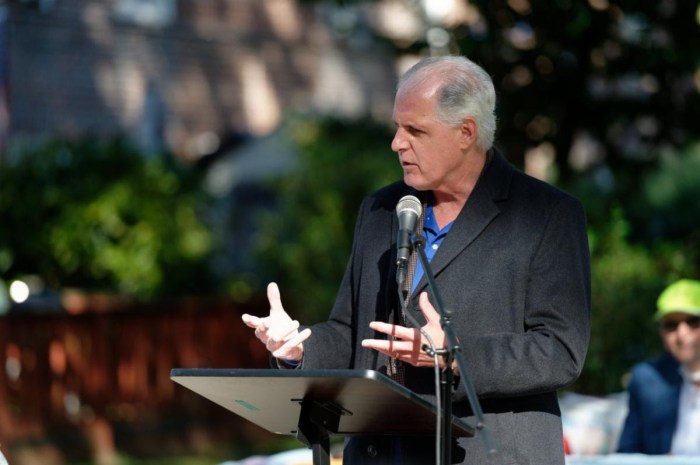By Joe Anuta
The city has spared one Hillcrest after-school program from the budget dance for 13 years, but is now planning to completely cut off its funding, program directors said at a Tuesday rally.
Students and instructors at the Adolescent After School 4 program stood on the steps of the Parsons Educational Complex, at 158-40 76th Road, to blast Mayor Michael Bloomberg’s proposed budget for next year, which will defund the program’s total $101,000 annual cost. That equates to 0.001 percent of the city’s entire $70 billion budget.
“The program gives them a chance to stay off the streets and set goals for themselves,” said Oswald Araujo, director of the Parsons Beacon program, which is run by the Child Center of New York, the same organization that oversees the adolescent program.
The educational service is offered at the Parsons Beacon building, but exists outside of its programming, Araujo said. It serves a minimum of 75 students throughout the year aged 12 to 21 who are emotionally and academically high-risk. Those children have access to a social worker and two mental health professionals, who provide workshops on topics like bullying and the dangers of drugs and gangs. They take the children on field trips and offer other recreational and educational activities as well, the center said.
Several students who participate in the program spoke in its defense, and one former student who is about to become a city school teacher said he would not be where he is without the guidance of his former caseworker.
The funds for the program are administered through the city Department of Health, which informed the care center in a December letter that all funding would dry up in the coming fiscal year.
Adam Karpati, executive deputy commissioner of the department’s Division of Mental Hygiene, whose annual salary in 2011 was about double the program’s annual budget, said declining resources have forced the department to make hard choices about what to cut.
“These cuts have been truly difficult choices,” he wrote.
“While [DOH] has worked hard to find savings by leveraging other funding streams, such as Medicaid, closing programs that were under-performing and capturing savings from programs that are closing voluntarily, we have been unable to avoid difficult cuts like that above.”
Should the cuts make it into the final budget, Araujo said the program would be forced to close, but a representative from the office of City Councilman James Gennaro (D-Fresh Meadows) said the lawmaker would look into restoring the needed cash.
Reach reporter Joe Anuta by e-mail at januta@cnglocal.com or by phone at 718-260-4566.


































